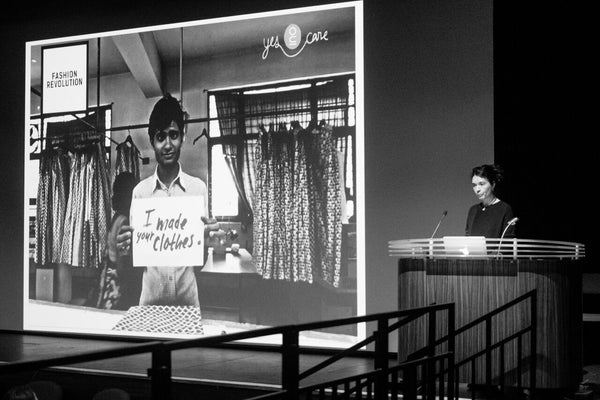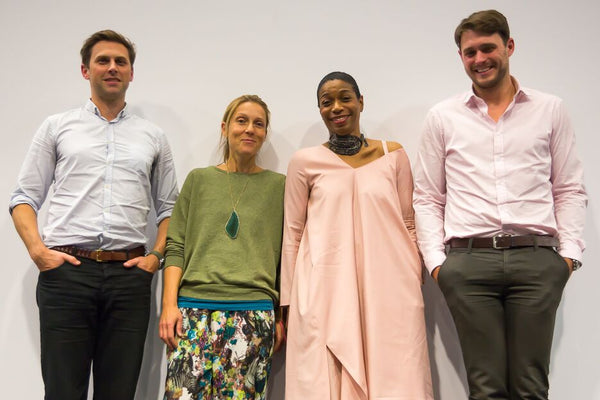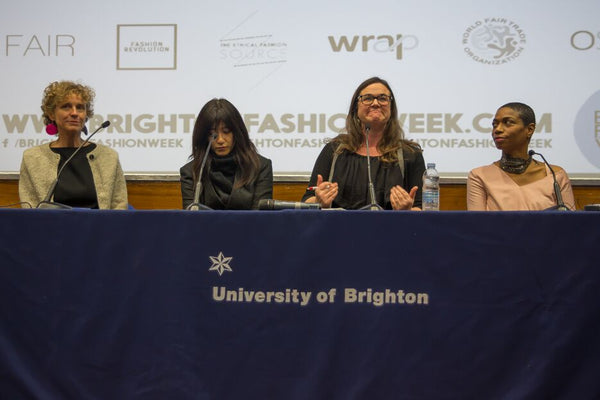
Brighton Fashion Week is in it's 6th full year and this year is all about sustainability. Throughout the day, we were treated to three main talks. First up was Orsola de Castr0 Co-Founder of Fashion Revolution followed by SCAP (Sustainable Clothing Action Plan) Talks with Anne Prahl, Ben Thomas and Carol Rose followed by a showing of "The New Black," a film about the future of fashion. The final discussion of the day was a panel comprised of Carol Rose (technical advisor for WRAP which focuses on reducing waste in all sectors of retail), filmmaker Leah Borromeo, Christine Gent (Executive Director of World Fair Trade Organization-Asia) and let by Clare Lissaman, ethical and fair trade consultant as well as heading Arthur & Henry ethical men's shirts.
Orsola de Castro walked us through the evolution of sustainability in the fashion industry. Up until 1997, there was no upcycling, recycling or much thought of sustainability in fashion; these were thought of as issues facing the food and supermarket industries. Though second-hand "vintage" styles took off in the late 1990's, the appeal was more aesthetic than out of concern for the environment or the amount of overabundance in apparel production. Orsola along with Filippo Ricci worked with the British Fashion Council to highlight emerging sustainable fashion designers during London Fashion Week in 2006 but severed ties in 2015. Orsola also discussed how she started Fashion Revolution after the Rana Plaza collapse which killed over a thousand garment workers in order to highlight all of the issues with the garment seemingly being ignored by the world.
The second discussion was around the different ways companies can and are changing the environmental impact the garment industry is having on the environment. First was Anne Prahl is a research, trend and design consultant who works with some major name fashion retailers to develop more sustainable practices into their businesses. According to Anne, about 80% of the environmental impact is made at the concept and design stage; in the future, in order for designers to become sustainable, they need to start from the very beginning. She also discussed the need to extend the life of our clothes, by proper construction, proper care and disposing of our clothes properly such as recycling.
Anne was followed by Ben Thomas, a senior consultant with Made By who works on supply chain transparency within the clothing industry. The focus of Made By is to make sustainable practices common within the fashion industry. They are achieving this by benchmarking different fibres with regards to their environmental impact so that designers and labels can make educated decisions when conceptualising and designing new collections.
Carol Rose was the next speaker to come to the podium. She discussed her work with the SCAP project where she works with some major high-street players to deliver aggressive environmental protection targets: 15% reduction in carbon and water footprint and waste to landfill reduction as well as a 3.5% reduction in waste arising over the whole product lifecycle. This equates to taking 250 cars off the road, saving 160,000 olympic swimming pools of water and reducing 16,000 tonnes of waste to landfills. One of Carol's projects is to produce a Sustainable Clothing Manual, a practical guide for enhancing clothing durability and performance which will help brands make smarter, more environmentally friendly decisions.

These discussions were followed up by a screening of the film "The Next Black" which was put together by AEG. The documentary discusses some of the innovation happening in the fashion industry where tech and science are becoming ever more integrated with our clothes.
In the end, there were some main themes throughout all of the discussions. As we have discussed, the fast-fashion phenomenon is not a sustainable business practice. We need to care for our shared home and one another through ethical business practices. We should be willing to spend a little more for our clothes and love them longer as there is someone on the other end who has to make a living creating these clothes for us. It is encouraging to see how so many of the major players are working to move to a sustainable place.
The final discussion of the day was with the panel. Carol Rose was joined by Christine Gent, Clare Lissaman and Leah Borromeo to have an open discussion with the audience about the issues the industry faces in turning sustainable, which was the main goal of Brighton Fashion Week. The recurring themes were around education on the impact the industry has on the environment as well as how we can educate children at earlier ages to make smarter decisions when shopping. Currently, we educate heavily on natural and fair trade foods, now this work needs to migrate to the clothing industry. There was consensus that there should be more transparency in the industry; while I wouldn't expect everyone to know who made that shirt they are wearing, it is useful to understand the working conditions garment workers face in order to help push the message that there needs to be change. Some of the fashion designers in the audience noted that they would love to turn to sustainable fabrics, but these are far from easy to come by and when you can, they is usually a significant cost barrier. One stated that recycled polyester, for example, can cost upward of 10 times the cost of buying new.

There's also the issue of consistency in what sustainability actually means. Some brands believe they meet the criteria because they pay a fair wage, some believe they are covered because they use only organic cotton. There are several organisations which focus on pieces of the definition of "sustainable," yet we need to get to one definition in order to hold each other responsible for upholding those ideals.
At the end of the day, sustainable business practices will not be a secondary benefit of any brand, but a necessity. Kering, the luxury fashion conglomerate which boasts Alexander McQueen and Stella McCartney among their portfolio, have done some great work to give a cash value to the environmental and social impact on their business and are incorporating that into their profit and loss statement. While Brighton Fashion Week was focused on those designers already making the commitment to sustainability, we will only truly get progress when the organisations, fashion labels and activists come together for change.
Learn more about Fashion Revolution here.
You can read up on SCAP and the 2020 commitment here.
Photos provided by Brighton Fashion Week.
